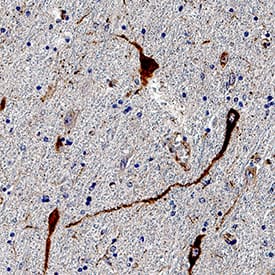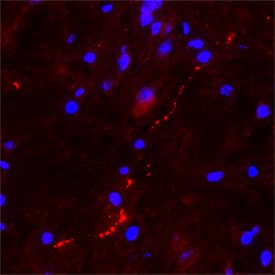Human/Mouse/Rat CART Antibody
R&D Systems, part of Bio-Techne | Catalog # AF163


Key Product Details
Species Reactivity
Validated:
Human, Mouse, Rat
Cited:
Mouse, Rat, Transgenic Mouse
Applications
Validated:
Immunohistochemistry, Western Blot
Cited:
Immunocytochemistry, Immunohistochemistry
Label
Unconjugated
Antibody Source
Polyclonal Goat IgG
Product Specifications
Immunogen
E. coli-derived recombinant human CART
Gln28-Leu116
Accession # Q16568
Gln28-Leu116
Accession # Q16568
Specificity
Detects human CART in direct ELISAs and Western blots. Also recognizes a truncated recombinant human CART containing amino acids 69-116.
Clonality
Polyclonal
Host
Goat
Isotype
IgG
Scientific Data Images for Human/Mouse/Rat CART Antibody
Detection of CART in Human Brain Hypothalamus Tissue.
CART was detected in immersion fixed paraffin-embedded sections of human brain (Hypothalamus) tissue using Goat Anti-Human/Mouse/Rat CART Antigen Affinity-purified Polyclonal Antibody (Catalog # AF163) at 1 µg/mL for 1 hour at room temperature followed by incubation with the Anti-Goat IgG VisUCyte™ HRP Polymer Antibody (VC004). Tissue was stained using DAB (brown) and counterstained with hematoxylin (blue). Specific staining was localized to neurons. Staining was performed using our IHC Staining with VisUCyte HRP Polymer Detection Reagents.CART in Mouse Brain Tissue.
CART was detected in perfusion fixed frozen sections of mouse brain tissue using Goat Anti-Human/Mouse/Rat CART Antigen Affinity-purified Polyclonal Antibody (Catalog # AF163) at 5 µg/mL overnight at 4 °C. Tissue was stained using the NorthernLights™ 557-conjugated Anti-Goat IgG Secondary Antibody (red; NL001) and counterstained with DAPI (blue). Specific staining was localized to neurons. Staining was performed using our Fluorescent IHC Staining of Frozen Tissue Sections.Applications for Human/Mouse/Rat CART Antibody
Application
Recommended Usage
Immunohistochemistry
1-15 µg/mL
Sample: Immersion fixed paraffin-embedded sections of human brain (Hypothalamus) tissue and perfusion fixed frozen sections of mouse brain tissue
Sample: Immersion fixed paraffin-embedded sections of human brain (Hypothalamus) tissue and perfusion fixed frozen sections of mouse brain tissue
Western Blot
0.1 µg/mL
Sample: Recombinant Human CART
Sample: Recombinant Human CART
Formulation, Preparation, and Storage
Purification
Antigen Affinity-purified
Reconstitution
Reconstitute at 0.2 mg/mL in sterile PBS. For liquid material, refer to CoA for concentration.
Formulation
Lyophilized from a 0.2 μm filtered solution in PBS with Trehalose. *Small pack size (SP) is supplied either lyophilized or as a 0.2 µm filtered solution in PBS.
Shipping
Lyophilized product is shipped at ambient temperature. Liquid small pack size (-SP) is shipped with polar packs. Upon receipt, store immediately at the temperature recommended below.
Stability & Storage
Use a manual defrost freezer and avoid repeated freeze-thaw cycles.
- 12 months from date of receipt, -20 to -70 °C as supplied.
- 1 month, 2 to 8 °C under sterile conditions after reconstitution.
- 6 months, -20 to -70 °C under sterile conditions after reconstitution.
Background: CART
References
- Douglass, J. & S. Daoud (1996) Gene 169:241.
- Douglass, J. et al. (1995) J. Neurosci. 15:247.
- Adams, L.D. et al. (1999) Brain Res. 848:137.
- Thim, L. et al. (1999) Proc. Natl. Acad. Sci. USA 96:2722.
- Bannon, A.W. et al. (2001) J. Pharmacol. Exp. Ther. 299:1021.
- Kuhar, M.J. & L.L. Yoho (1999) Synapse 33:163.
- Thim, L. et al. (1998) FEBS Lett. 428:263.
Long Name
Cocaine- and Amphetamine-regulated Transcript Protein
Alternate Names
CARTPT
Entrez Gene IDs
9607 (Human)
Gene Symbol
CARTPT
UniProt
Additional CART Products
Product Documents for Human/Mouse/Rat CART Antibody
Product Specific Notices for Human/Mouse/Rat CART Antibody
For research use only
